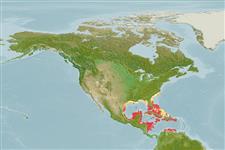Elasmobranchii (tubarões e raias) (sharks and rays) >
Myliobatiformes (Stingrays) >
Urotrygonidae (American round stingrays)
Etymology: Urobatis: Greek,oura = tail + Greek, batis, batidos = a ray (Raja sp.) (Ref. 45335).
More on author: Cuvier.
Environment: milieu / climate zone / depth range / distribution range
Ecologia
marinhas associadas(os) a recifes; intervalo de profundidade 1 - 25 m (Ref. 9710). Tropical; 37°N - 7°N, 100°W - 59°W (Ref. 55316)
Western Atlantic: North Carolina, USA to northern South America. Also in Bahamas, Yucatan and throughout Caribbean (Ref. 26938).
Tamanho / Peso / Idade
Maturity: Lm ? range ? - ? cm
Max length : 76.0 cm TL macho/indeterminado; (Ref. 9710)
Descrição suscinta
Morfologia | Morfometria
Edge of disk no sharp angles, no dorsal fin. Well-developed caudal fin extends around tip of tail, doubly serrate spine near caudal fin base (Ref. 26938). Disk yellowish, with dark vermiculations and spots that form a variety of patterns on upper surface (Ref. 7251). Lower surface is yellowish, greenish or brownish white, tail with dark spots (Ref.6902).
Commonly found along sandy beaches to the water's edge, and especially in sandy areas in and around coral reefs (Ref. 7251). Raises front end of disc to attract prey seeking shelter (Ref. 7251). Feeds on shrimps, probably also on small fishes, clams, and worms (Ref. 12951). Known to be capable of inflicting dangerous wounds with its venomous spine. Easily approached (Ref. 9710). A live-bearing species, produces 3 to 4 young (Ref. 26938).
Ciclo de vida ou comportamento de acasalamento
Maturidade | Reprodução | Desova | Ovos | Fecundidade | Larvas
Male grasps disc margin of female, swings under her and inserts a clasper. Mating pair is surrounded by other males that swim around and nudge them. Dugger (1987) (Ref. 51118) observed both male and female biting the pectoral fin of its mate (Ref. 49562).
Compagno, L.J.V., 1999. Checklist of living elasmobranchs. p. 471-498. In W.C. Hamlett (ed.) Sharks, skates, and rays: the biology of elasmobranch fishes. Johns Hopkins University Press, Maryland. (Ref. 35766)
Status na Lista Vermelha da UICN (Ref. 130435)
Ameaça para os humanos
Venomous
Uso pelos humanos
Aquário: Aquários públicos
Mais informação
Idade/TamanhoCrescimentoPeso-comprimentoComprimento-comprimentoFrequências de comprimentoMorfometriaMorfologiaLarvasDinâmica larvalRecrutamentoAbundânciaBRUVS
ReferênciasAquaculturaPerfil para aquaculturaEstirpesGenéticaElectrophoresesHereditariedadeDoençasProcessamentoNutrientsConversão de massa
ColaboradoresFotosStamps, Coins Misc.SonsCiguateraVelocidadeTipo de nataçãoÁrea branquialOtólitosCérebrosVisão
Ferramentas
Relatórios especiais
Baixar XML
Fontes da internet
Estimates based on models
Preferred temperature (Ref.
123201): 25.8 - 28.1, mean 27.3 °C (based on 482 cells).
Índice de diversidade filogenética (Ref.
82804): PD
50 = 0.5078 [Uniqueness, from 0.5 = low to 2.0 = high].
Bayesian length-weight: a=0.01072 (0.00570 - 0.02016), b=3.03 (2.86 - 3.20), in cm total length, based on LWR estimates for this species & (Sub)family-body (Ref.
93245).
Nível Trófico (Ref.
69278): 3.6 ±0.51 se; based on food items.
Resiliência (Ref.
120179): Muito baixo(a), tempo mínimo de duplicação da população maior que 14 anos (Preliminary K or Fecundity.).
Fishing Vulnerability (Ref.
59153): Moderate to high vulnerability (50 of 100).
Nutrients (Ref.
124155): Calcium = 7.17 [0.77, 112.55] mg/100g; Iron = 0.376 [0.030, 3.868] mg/100g; Protein = 20.4 [15.0, 25.6] %; Omega3 = 0.069 [0.021, 0.205] g/100g; Selenium = 24.1 [4.1, 110.7] μg/100g; VitaminA = 47.1 [3.2, 591.0] μg/100g; Zinc = 0.963 [0.062, 10.956] mg/100g (wet weight);
